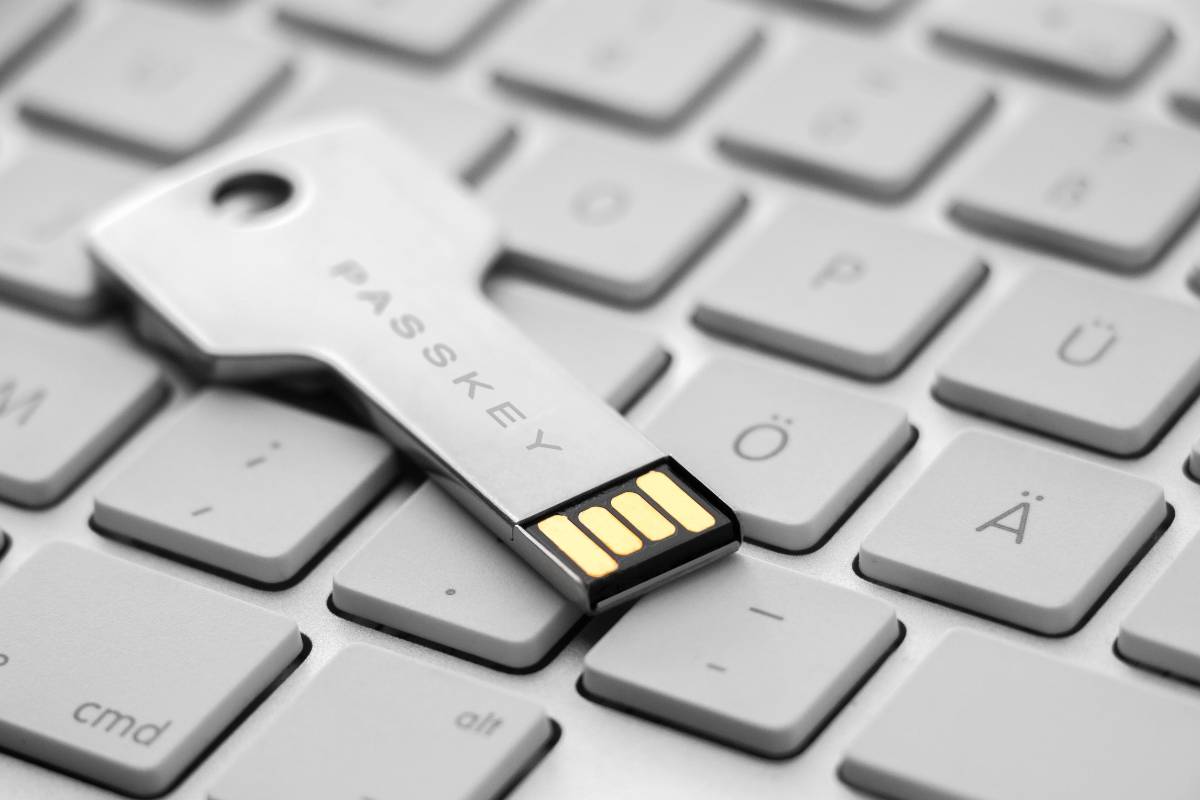Technology and retail giants such as Amazon, Walmart, Canva, and many others are leading a revolution in digital security by moving away from traditional passwords in favor of a much more advanced solution: passkeys.
This movement signals the end of an era dominated by easily forgotten passwords that are frequently compromised in data breaches.
Goodbye Passwords: How Passkeys Are Redefining Digital Security

Who hasn’t forgotten a password or feared falling for a phishing scam? Passkeys solve these problems — it’s a modern authentication method that eliminates the need for traditional passwords.
They work based on a cryptographic system consisting of two parts: a private key, securely stored on the user’s device (such as smartphones or computers, in secure areas like Apple’s Secure Enclave or Windows’ Trusted Platform Module), and a public key, maintained by the services or applications that support them.
Instead of memorizing a combination of letters, numbers, and special characters, users can log in using biometrics (like fingerprints or facial recognition) or PIN codes. The use of biometrics or PIN allows the service to access the private key stored on the device.
In practice, the login occurs when the user’s device uses the private key to generate a digital signature in response to a service request. This signature is validated by the public key stored on the server, granting access. Here’s how it works:
- The user initiates login to the website or app.
- The server sends a request to the user’s device.
- The device prompts the user to authenticate via biometrics or PIN.
- Once authenticated, the device uses the private key to create a digital signature, which is sent to the server.
- The server validates the signature using the public key and grants access, ensuring the request came from the correct device and rightful key owner.
This is possible because the private and public keys interact, creating a virtually unbreakable security layer.
Are passkeys more secure than traditional passwords?
Yes, passkeys are significantly more secure for several reasons:
- Immune to phishing attacks: Unlike passwords, which can be entered on fake websites, passkeys work exclusively on the site or app for which they were configured.
- Protection against brute force attacks: Since passkeys are generated using cryptography, they cannot be guessed or exposed in data breaches.
- Reduced impact of breaches: Even if a server is compromised, hackers cannot use public keys to access other accounts or services, as they do not possess the private keys, which remain stored locally on the user’s device and never on the server.
Additionally, passkeys eliminate the reuse of passwords across multiple accounts and services, a common issue that increases vulnerability in the event of a single breach.
Where can passkeys be used?
In virtually any sector involving logins. More and more companies are replacing passwords with passkeys, including giants like Google, Apple, Microsoft, and PayPal.
According to a report by 1Password, over 200 companies have already implemented this authentication method, ranging from technology and retail sectors to financial services. Examples include:
- E-commerce: Amazon, Walmart, Target.
- Entertainment: Playstation, Discord, Canva.
- Finance: PayPal and digital banks.
The number of companies adopting this method has doubled in the past year, and it is expected that in the coming years, virtually all digital services will use passkeys as the standard authentication method.
Why are passkeys the future? 200+ giants already know this
The transition to passkeys is more than a trend; it is a strategic step towards a more secure and convenient future.
Companies like Amazon and Walmart, which handle billions of transactions annually, understand that passkeys not only improve the customer experience but also reduce costs related to fraud and technical support for password recovery.
This widespread adoption of passkeys is being driven by organizations such as the FIDO Alliance, which has been developing passwordless authentication standards in partnership with tech giants since 2013. The strongest evidence that this technology is here to stay is that Apple, Microsoft, and Google, for instance, already use passkeys in their operating systems.
Moreover, recent data indicates that over 4.2 million passkeys have already been stored in applications like 1Password, with 73% of users adopting passkeys being individual consumers, showing that this solution’s acceptance extends beyond corporate policies.
Benefits for companies and users
- For companies: Reduced operational costs and increased consumer trust.
- For users: Enhanced security and convenience, eliminating the need to remember or manage complex passwords.
NextAge’s role in digital transformation
As a leading Brazilian company in system development and maintenance, NextAge is at the forefront of digital transformation. Offering robust and customized technological solutions, NextAge is ready to help companies adopt the latest innovations.
With over 16 years of experience, more than 600 clients, and a presence in 9 countries, NextAge combines technical expertise with personalized service, delivering solutions that enhance security and business efficiency.
Our key services include:
- Outsourcing 2.0: Allocation of qualified and flexible teams to meet specific demands.
- System Maintenance 2.0: Ensuring continuous and secure operation of critical applications.
- Strategic Assessment and Deep Discovery: Precise diagnostics to identify and implement strategic improvements.
Renowned companies such as Odebrecht, Sicredi, and Positivo already trust NextAge for their digital initiatives. Want to take your business to the next level? Contact us and discover how we can transform your business!

 English
English  Português
Português











